- Home
- Sherry Thomas
Ravishing the Heiress Page 2
Ravishing the Heiress Read online
Page 2
“Yes, my lord?”
“I’d like you to keep playing no matter what I say.”
Her heart skipped a beat. Now it was beginning to make sense. He wanted to sit next to her so that they could hold a private conversation in a room full of their elders.
“All right. I’ll keep going,” she answered. “What is it that you want to say, sir?”
“I’d like to know, Miss Graves, are you being forced into marriage?”
Ten thousand hours before the pianoforte was the only thing that kept Millie from coming to an abrupt halt. Her fingers continued to pressure the correct keys; notes of various descriptions kept on sprouting. But it could have been someone in the next house playing, so dimly did the music register.
“Do I—do I give the impression of being forced, sir?” Even her voice didn’t quite sound her own.
He hesitated slightly. “No, you do not.”
“Why do you ask, then?”
“You are sixteen.”
“It is far from unheard of for a girl to marry at sixteen.”
“To a man more than twice her age?”
“You make the late earl sound decrepit. He was a man in his prime.”
“I am sure there are thirty-three-year-old men who make sixteen-year-olds tremble in romantic yearning, but my cousin was not one of them.”
They were coming to the end of the page; he turned it just in time. She chanced a quick glance at him. He did not look at her.
“May I ask you a question, my lord?” she heard herself say.
“Please.”
“Are you being forced to marry me?”
The words left her in a spurt, like arterial bleeding. She was afraid of his answer. Only a man who was himself being forced would wonder whether she, too, was under the same duress.
He was silent for some time. “Do you not find this kind of arrangement exceptionally distasteful?”
Glee and misery—she’d been bouncing between the two wildly divergent emotions. But now there was only misery left, a sodden mass of it. His tone was courteous. Yet his question was an accusation of complicity: He would not be here if she hadn’t agreed.
“I—” She was playing the adagio sostenuto much too fast—no moonlight in her sonata, only storm-driven branches whacking at shutters. “I suppose I’ve had time to become inured to it: I’ve known my whole life that I’d have no say in the matter.”
“My cousin held out for years,” said the earl. “He should have done it sooner: begotten an heir and left everything to his own son. We are barely related.”
He did not want to marry her, she thought dazedly, not in the very least.
This was nothing new. His predecessor had not wanted to marry her, either; she had accepted his reluctance as par for the course. Had never expected anything else, in fact. But the unwillingness of the young man next to her on the piano bench—it was as if she’d been forced to hold a block of ice in her bare hands, the chill turning into a black, burning pain.
And the mortification of it, to be so eager for someone who reciprocated none of her sentiments, who was revolted by the mere thought of taking her as a wife.
He turned the next page. “Do you never think to yourself, I won’t do it?”
“Of course I’ve thought of it,” she said, suddenly bitter after all these years of placid obedience. But she kept her voice smooth and uninflected. “And then I think a little further. Do I run away? My skills as a lady are not exactly valuable beyond the walls of this house. Do I advertise my services as a governess? I know nothing of children—nothing at all. Do I simply refuse and see whether my father loves me enough to not disown me? I’m not sure I have the courage to find out.”
He rubbed the corner of a page between his fingers. “How do you stand it?”
This time there was no undertone of accusation to his question. If she wanted to, she might even detect a bleak sympathy. Which only fed her misery, that foul beast with teeth like knives.
“I keep myself busy and do not think too deeply about it,” she said, in as harsh a tone as she’d ever allowed herself.
There, she was a mindless automaton who did as others instructed: getting up, going to sleep, and earning heaps of disdain from prospective husbands in between.
They said nothing more to each other, except to exchange the usual civilities at the end of her performance. Everyone applauded. Mrs. Clements said very nice things about Millie’s musicianship—which Millie barely heard.
The rest of the evening lasted the length of Elizabeth’s reign.
Mr. Graves, usually so phlegmatic and taciturn, engaged the earl in a lively discussion of cricket. Millie and Mrs. Graves gave their attention to Colonel Clements’s army stories. Had someone looked in from the window, the company in the drawing room would have appeared perfectly normal, jovial even.
And yet there was enough misery present to wilt flowers and curl wallpaper. Nobody noticed the earl’s distress. And nobody—except Mrs. Graves, who stole anxious looks at Millie—noticed Millie’s. Was unhappiness really so invisible? Or did people simply prefer to turn away, as if from lepers?
After the guests took their leave, Mr. Graves pronounced the dinner a succès énorme. And he, who’d remained skeptical on the previous earl throughout, gave his ringing endorsement to the young successor. “I shall be pleased to have Lord Fitzhugh for a son-in-law.”
“He hasn’t proposed yet,” Millie reminded him, “and he might not.”
Or so she hoped. Let them find someone else for her. Anyone else.
“Oh, he will most assuredly propose,” said Mr. Graves. “He has no choice.”
Do you really have no other choices, then?” asked Isabelle.
Her eyes were bright with unshed tears. Futility burned inside Fitz. He could do nothing to halt this future that hurtled toward him like a derailed train, and even less to alleviate the pain of the girl he loved.
“If I do, it is only in the sense that I am free to go to London and see if a different heiress will have me.”
She turned her face away and wiped her eyes with the heel of her hand. “What is she like, this Miss Graves?”
What did it matter? He could not recall her face. Nor did he want to. “Unobjectionable.”
“Is she pretty?”
He shook his head. “I don’t know—and I don’t care.”
She was not Isabelle—she could never be pretty enough.
It was unbearable to think of Miss Graves as a permanent fixture in his life. He felt violated. He raised the shotgun in his hands and pulled the trigger. Fifty feet away, a clay pigeon exploded. The ground was littered with shards: It had been an excruciating conversation.
“So, this time next year, you could have a child,” said Isabelle, her voice breaking. “The Graveses would want their money’s worth—and soon.”
God, they would expect that of him, wouldn’t they? Another clay pigeon burst apart; he scarcely felt the recoil in his shoulder.
It hadn’t seemed quite so terrible at first, becoming an earl out of the blue. He realized almost immediately he’d have to give up his plan of a career in the military: An earl, even a poor one, was too valuable for the front line. The blow, although harsh, was far from fatal. He’d chosen the military for the demands it would place on him. Returning an estate from the brink of ruin was just as demanding and honorable an occupation. And he did not think Isabelle would at all mind becoming a ladyship: She would cut a dashing figure in Society.
But as he stepped into Henley Park, his new seat, his blood began to congeal. At nineteen, he had not become a poor earl, but a desperately destitute one.
The manor’s decline was frightful. The oriental carpets were moth-eaten, the velvet curtains similarly so. Many of the flues drew not at all; walls and paintings were grimy with soot. And in every last upper-story room, the ceiling was green and grey with growth of mold, spreading like the contours of a distorted map.
Such a large house demanded fifty indoor se
rvants and could limp by with thirty. But at Henley Park, the indoor staff had been reduced to fifteen, roughly divided between the too young—several of the maids were barely twelve—and the too old, retainers who had been with the family for their entire lives and had nowhere else to go.
Everything in his room creaked: the floor, the bed, the doors of the wardrobe. The plumbing was medieval—the long decline of the family’s fortune had precluded any meaningful modernization of the interior. And for the three nights of his stay, he’d gone to sleep shivering with cold, listening to the congregation of rats in the walls.
It was a step above outright dilapidation, but only a very small step.
Isabelle’s family was thoroughly respectable. The Pelhams, like the Fitzhughs, were related to several noble lineages and in general considered just the sort of solid, upstanding, God-fearing country gentry that did the squirearchy proud. But neither the Fitzhughs nor the Pelhams were wealthy; what funds they could scrape together would not keep Henley Park’s roof from leaking, or her foundation from rotting.
But if it were only the house, they might still have somehow managed with various economies. Unfortunately, Fitz also inherited eighty thousand pounds in debt. And from that, there was no escape.
Were he ten years younger, he could bury his head in the sand and let Colonel Clements worry about his problems. But he was only two years short of majority, a man nearly grown. He could not run away from his troubles, which assuredly would only worsen during any period of inattention.
The only viable solution was the sale of his person, to exchange his cursed title for an heiress with a fortune large enough to pay his debts and repair his house.
But to do that, he would have to give up Isabelle.
“Please, let’s not speak of it,” he said, his teeth clenched.
He didn’t want much in life. The path he’d delineated for himself had been simple and straightforward: officer training at Sandhurst, a commission to follow, and when he’d received his first promotion, Isabelle’s hand in marriage. She was not only beautiful, but intelligent, hardy, and adventurous. They would have been deliriously happy together.
Tears rolled down her face. “But whether we speak of it or not, it’s going to happen, isn’t it?”
She raised her shotgun and blasted the last remaining clay pigeon to pieces. His heart was similarly shattered.
“No matter what happens…”
He could not continue. He was no longer in a position to declare his love for her. Whatever he said would only make things worse.
“Don’t marry her,” she implored, her voice hoarse, her eyes fervent. “Forget Henley Park. Let’s run away to-gether.”
If only they could. “Neither of us is of age. Our marriage wouldn’t be valid without the consent of your father and my guardian. I don’t know about your father, but Colonel Clements is dead set on my doing my duty. He’d rather see you ruined than allow our marriage to stand.”
Overhead thunder rolled. “Isabelle, Lord Fitzhugh,” cried her mother’s voice from inside the house, “better come back. It’s going to rain soon!”
Neither of them moved.
Drops of rain fell on his head, each as heavy as a pebble.
Isabelle gazed at him. “Do you remember the first time you came to visit?”
“Of course.”
He’d been sixteen, she fifteen. It had been at the end of Michaelmas Half. And he’d arrived with Pelham, Hastings, and two other mates from Eton. She’d sprinted down the stairs to hug Pelham. Fitz had met her before, when she’d come to see Pelham at Eton. But on that day, suddenly, she was no longer the little girl she’d been, but a lovely young lady, full of life and verve. The afternoon sun, slanting into the hall, had lit her like a flame. And when she’d turned around and said, “Ah, Mr. Fitzhugh, I remember you,” he was already in love.
“Do you remember the fight scene from Romeo and Juliet?” she asked softly.
He nodded. Would that time flowed backward, so he could leave the present behind and head toward those older, more joyous days instead.
“I remember everything so clearly: Gerry was Tybalt and you Mercutio. You had one of my father’s walking sticks in one hand and a tea sandwich in the other. You took a bite of the sandwich, and sneered, ‘Tybalt, you rat-catcher, will you walk?’” She smiled through her tears. “Then you laughed. My heart caught and I knew then and there that I wanted to spend my life with you.”
His face was wet. “You’ll find someone better,” he forced himself to say.
“I don’t want anyone else. I want only you.”
And he wanted only her. But it was not to be. They were not to be.
Rain came down in sheets. It had been a miserable spring. Already he despaired of ever again walking under an unclouded sky.
“Isabelle, Lord Fitzhugh, you must come inside now,” repeated Mrs. Pelham.
They ran. But as they reached the side of the house, she gripped his arm and pulled him toward her. “Kiss me.”
“I mustn’t. Even if I don’t marry Miss Graves, I’m to marry someone else.”
“Have you ever kissed anyone?”
“No.” He’d been waiting for her.
“All the more reason you must kiss me now. So that no matter what happens, we will always be each other’s first.”
Lightning split the sky. He stared at the beautiful girl who would never be his. Was it so wrong?
It must not be, because the next moment he was kissing her, lost to everything else but this one last moment of freedom and joy.
And when they could no longer delay their return to the house, he held her tight and whispered what he’d promised himself he would not say.
“No matter what happens, I will always, always love you.”
CHAPTER 2
Eight years later, 1896
I hear Mrs. Englewood has arrived in London,” said Millicent, Lady Fitzhugh, at breakfast.
Fitz looked up from his paper. The strangest thing: His wife never gossiped, yet she seemed to know everything the moment it happened.
She wore a morning gown of cornflower blue. The morning gown, worn strictly indoors among intimates, was looser of form and construction than its more tightly corseted cousins the promenade gown and the visiting gown. But there was something about his wife that was highly—almost excessively—neat, so that even the slouchier morning gown looked prim and precise on her.
Her light brown hair was pulled back into a tight bun, not a strand loose—never a strand loose, except when she’d smashed a brick fireplace wielding a sledgehammer. Her eyes, a similar shade to her hair, busily scanned one invitation after another. Sweet eyes—she never looked upon anyone in anger, seldom even in displeasure.
Sometimes it surprised him how young she still looked. How young she still was. They’d been married almost eight years and she was not even twenty-five.
“Yes,” he answered, “your information is correct, as usual.”
She reached for the salt cellar. “When did you learn?”
“Yesterday evening,” he said, his heart skipping a beat with anticipation.
Isabelle. Seven years it had been since his last glimpse of her on her wedding day. Eight, since they last spoke.
And now she was coming back into his life, a free woman.
Lady Fitz sliced open another envelope and glanced at its content. “She will be eager to see you, I’m sure.”
He had known, since he first met the former Millicent Graves, that she was unusually self-possessed. Still, sometimes her even-keeledness surprised him. He knew of no other wife who combined this sincere interest in a husband’s welfare with such a lack of possessiveness—at least none who didn’t have a lover of her own.
“One hopes,” he said.
“Would you like me to rearrange your schedule in any way?” she asked without looking at him. “If I’m not mistaken, we are expected tomorrow at the bottling plant to taste the champagne cider and the new lemon-flavor soda wa
ter. And the day after tomorrow, the biscuit factory for cream wafers and chocolate croquette.”
Isabelle’s return had coincided with the semiannual taste test of new product ideas at Cresswell & Graves.
“Thank you, but it won’t be necessary: I am invited to call on her today itself.”
“Oh,” said his wife.
Her countenance often reminded him of blancmange, smooth, mild, and perfectly set. But this moment, an unnamed emotion flickered across her features. And suddenly she resembled not so much a bland dish of pudding as the surface of a well-known, yet never explored lake, and he, standing on the banks, had just seen a movement underwater, an enigmatic shadow that disappeared so quickly he wasn’t sure he hadn’t imagined the whole thing.
“Then you must convey my regards,” she said, reaching again for the salt cellar.
“I shall.”
She inspected the rest of the post in her pile, finished her tea, and rose—she always arrived to and left from breakfast before he did. “Don’t forget we are expected to dinner at the Queensberrys’.”
“I won’t.”
“Good day, then, sir.”
“Good day, Lady Fitz.”
Her gait was as neat as her person, her blue skirts barely swishing as she turned down the corridor. By habit he listened as her footsteps receded, the cadence and lightness of her footfalls almost as familiar to him as the rhythm of his own breaths.
When he could hear her no more, he pulled Isabelle’s note out of the inside pocket of his day coat and read it again.
My Dearest Fitz,
(Am I too forward in the salutation itself? No matter, I have never been the least reticent and I certainly won’t change now.)
Thank you for the lovely house you have arranged for myself and the children. They adore the garden, tucked away from sight. I am particularly fond of the bright, cheerful parlor, which overlooks the green square just across the street.
Such a long time it has been since I last saw you, a few more days ought not to matter very much. Yet I find myself extraordinarily impatient to meet again, even though the house is clearly not yet ready to receive callers. Will you come tomorrow?

_preview.jpg) Claiming the Duchess (Fitzhugh Trilogy Book 0.5)
Claiming the Duchess (Fitzhugh Trilogy Book 0.5)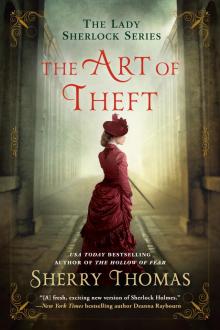 The Art of Theft
The Art of Theft The Magnolia Sword: A Ballad of Mulan
The Magnolia Sword: A Ballad of Mulan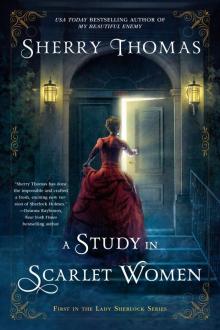 A Study In Scarlet Women
A Study In Scarlet Women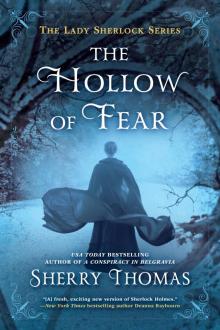 The Hollow of Fear
The Hollow of Fear The Magnolia Sword
The Magnolia Sword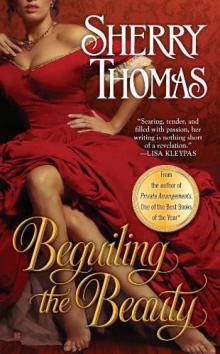 Beguiling the Beauty ft-1
Beguiling the Beauty ft-1 The Heart is a Universe
The Heart is a Universe The Hidden Blade: A Prequel to My Beautiful Enemy (Heart of Blade)
The Hidden Blade: A Prequel to My Beautiful Enemy (Heart of Blade)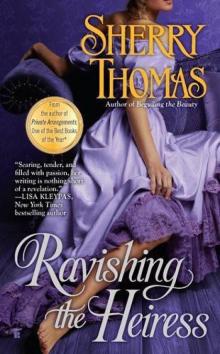 Ravishing the Heiress ft-2
Ravishing the Heiress ft-2 The Immortal Heights
The Immortal Heights The Hidden Blade
The Hidden Blade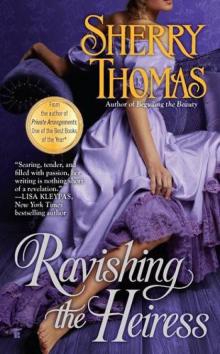 Ravishing the Heiress
Ravishing the Heiress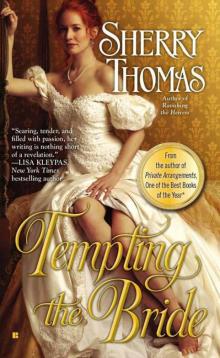 Tempting the Bride
Tempting the Bride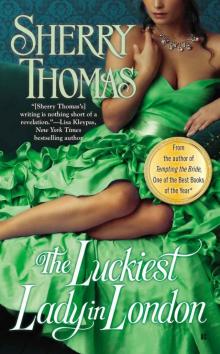 The Luckiest Lady in London
The Luckiest Lady in London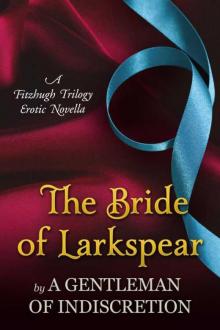 The Bride of Larkspear: A Fitzhugh Trilogy Erotic Novella
The Bride of Larkspear: A Fitzhugh Trilogy Erotic Novella Claiming the Duchess
Claiming the Duchess The One in My Heart
The One in My Heart His At Night
His At Night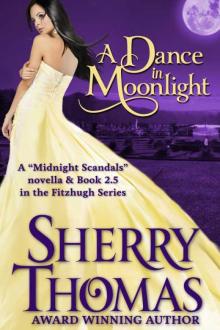 A Dance in Moonlight
A Dance in Moonlight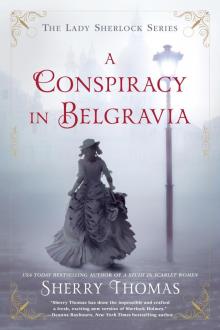 A Conspiracy in Belgravia
A Conspiracy in Belgravia Not Quite a Husband
Not Quite a Husband